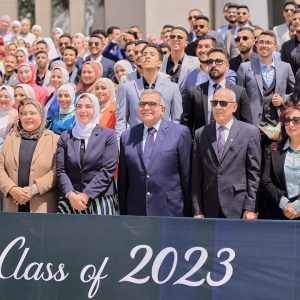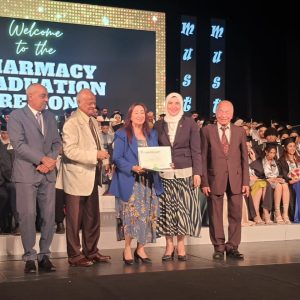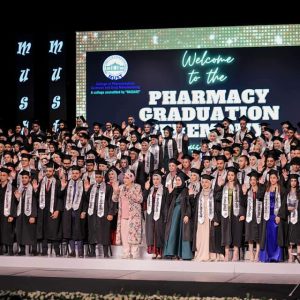Graduation requirements for each college are specified in standard units called credits. One
semester credit hour represents one hour of lecture or 2 hours of lab or practical work each week
for 16 weeks.
- The Academic Semester System
The university follows the semester system in which the academic year is divided into two
instructional semesters of 16 weeks each.
An eight-week summer session is also available after the second semester.
- Credits and Contact Hours
The academic value of each course is stated in semester credits. Each credit is normally
earned by attending one (50 minute) hour of lecture per week for the entire semester or by
attending a laboratory or practical period of two or three hours per week.
Each course states the number of semester credits assigned to the course as well as the
number of lecture contact hours and lab or practical contact hours.
To be awarded the bachelor’s degree, students must complete the required credit hours in
courses in which the grades are D or better and must earn a cumulative grade point average of
1.5 or better. These requirements must be completed within the period specified for each
college.
For the College of Pharmaceutical Sciences DRUG MANUFACTURING: A minimum of 189
credit hours are to be completed within a maximum of 9 years. Students will register for 12
credits as minimum and 20 credits as maximum per week. A student may be allowed to register
for 23 credits at the last graduation semester.
During the first two weeks at the beginning of each semester, students are allowed to
change their registration by adding or dropping courses after consulting their academic
advisors—provided they do not exceed the maximum credits allowed. “Drop-and-Add Forms”
are available at the Registrar’s Office. Check the university calendar for the drop-and-add
schedule.
Students may withdraw a particular course (or courses) if they find (through quizzes and
mid-term exam) that they will be unable to complete that course successfully. In such case, the
student must file a “Withdrawal Form” after consulting the academic advisor and the course
instructor. Courses withdrawn before the deadline for course withdrawal will have a “W” in the
grade report. These courses are not counted toward graduation and their credits are not used to
compute the GPA. Courses withdrawn after the deadline of course withdrawal automatically
receive a failing grade “F” and their credit points are used to compute the GPA. English language
courses (ENGL 101) and (ENGL 102) may not be withdrawn from. No refund will be given for
courses withdrawn.
If a student faces unanticipated circumstances that would prevent him/her from
completing the requirements of a course—such as sudden illness—during the final he/she may
ask for an Incomplete (I) in this course. A petition has to be submitted to the college dean stating
reasons for requesting “incomplete” and enlacing supporting evidence. Students who have done
unsatisfactory work in quizzes and mid-term examination are not eligible for incomplete.
If after careful scrutiny the petition is accepted, “a request for an incomplete form” has to
be filed specifying the requirements the student has to fulfil to complete the course and the date
suggested for meeting such requirement. After successful completion of the requirements, the
instructor would fill in “a change of grade form”. If the requirements are not completed in due
date or before the end of the following semester, an “incomplete” will automatically be changed
to an “F”.
Students who have an “incomplete” in any course during a semester will lose the fee
reduction scholarships in the following semester.
If a student fails in a required course, he has to repeat the same course, but if he fails in an
elective course, he may repeat the course or take another elective course instead after consulting
his academic advisor and the approval of the college dean. Students are not allowed to repeat
courses they have already taken with a passing grade of “D” or better.
- Class Attendance Regulations
Students should attend all classes for which they are registered to obtain maximum
educational benefits. Absence or lateness does not excuse students from required course work.
Students whose absence record exceeds 25 % of course hours are not allowed to sit for the final
exam and receive a failing grade “F” in that course.
Semester grades are reported by letter only. The scale of grades and grade points are as
follows:
| Grade |
Written Grade |
Points |
percentage |
| A+ |
Excellent |
4 |
95 – 100 |
| A |
Excellent |
4 |
90 – >95 |
| A- |
Excellent |
3.6 |
85 – >90 |
| B+ |
Verry Good |
3.3 |
80 – >85 |
| B |
Verry Good |
3 |
75 – >80 |
| B- |
Verry Good |
2.7 |
72 – >75 |
| C+ |
Good |
2.3 |
70 – > 72 |
| C |
Good |
2 |
65 – > 70 |
| C- |
Pass |
1.7 |
63 – >65 |
| D+ |
Pass |
1.3 |
62 – > 63 |
| D |
Pass |
1 |
60 – > 62 |
| F |
Fill |
Zero |
>60 |
* No points are given and they are not counted in the GPA
- Grade Point Average GPA and CGPA
Grade point Average (GPA) is computed each semester to show the student’s academic
standing. It is computed by multiplying each course credits by the grade points corresponding to
the grade received, then adding all points earned and dividing the total by the number of credits
in the semester. As the student progresses in his study, his transcript will show a grade point
average for each semester as well as a cumulative grade point average CGPA of all courses
taken in different semesters. Students should earn a successful grade in each course studied.
On graduation a general CGPA is calculated by adding the grade points for all courses
studied and dividing the grand total by the total number of credits required for graduation.










